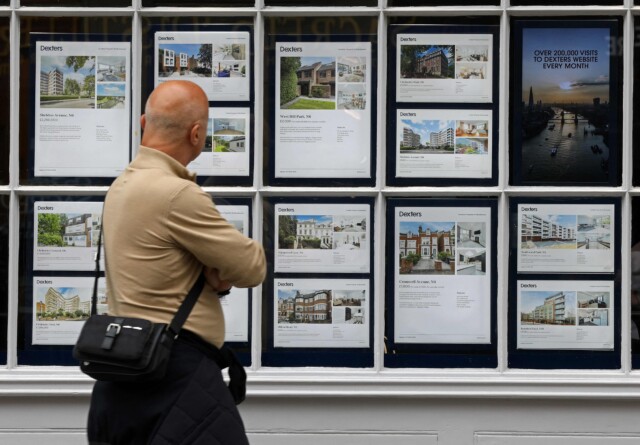
THE average house price edged down in September, from a record high recorded the previous month, according to an index.
According to Halifax, the housing market may have already entered a more sustained period of slower growth.
Annual house price growth is strongest in Wales, at 14.8%.
Across the UK, house prices fell back slightly by 0.1% in September, according to the figures from Halifax.
The annual rate of house price growth also slowed to 9.9% in September from 11.4% in August – returning to single digits for the first time since January.
A typical UK property now costs £293,835, according to Halifax’s index.
The number of mortgage products available fell sharply following the recent mini Budget and as product choice has gradually returned, lenders have been pricing their mortgage deals upwards.
The average five-year fixed-rate mortgage and the average two-year fix breached 6% this week – the first time this has happened in more than a decade – according to data from Moneyfacts.co.uk.
Kim Kinnaird, director at Halifax Mortgages, said: “The events of the last few weeks have led to greater economic uncertainty, however in reality house prices have been largely flat since June, up by around £250.
“This compares to a rise of more than £10,000 during the previous quarter, suggesting the housing market may have already entered a more sustained period of slower growth.
“Predicting what happens next means making sense of the many variables now at play and the housing market has consistently defied expectations in recent times.
Kim said that stamp duty cuts, housing shortages, rising interest rates and higher mortgage borrowing costs are likely to lead to “downward pressures” on house prices in the months ahead.
It comes after HOAR reported that house buyers are haggling to get cheap house prices amid mortgage borrowing fears.
Kim said: “This will undoubtedly be a cause of some concern for homeowners but the unprecedented rate of property price inflation we’ve seen in recent years has been far above the historic average.
“It’s important to look at slower growth in this context – since the start of the pandemic average property values have risen by around 23% with detached house prices up by more than £100,000 over the same period.”
Looking across the UK, annual house price growth is strongest in Wales, at 14.8%.
Meanwhile, Scotland, London, Eastern England and the North East of England have seen annual house price inflation fall to single-digit levels.
The West Midlands has overtaken the South West to record the strongest rate of annual growth in England, with house prices rising by 13.3% over the past year.
Mark Harris, chief executive of mortgage broker SPF Private Clients, said: “While the turmoil of the past couple of weeks will go down in the history books, the money markets seem to have settled a little.
Alice Haine, a personal finance analyst at Bestinvest, said: “While the pace of mortgage rate rises has accelerated since the mini Budget, the situation is not a complete surprise.
“Mortgage costs have been increasing steadily since December when the Bank of England first started pushing up its base rate from a record low of 0.1% in a bid to curb runaway inflation.
“The base rate now sits at 2.25%, with expectations it might jump up to 1% at the Monetary Policy Committee meeting next month, pushing up mortgage rates once again.”
Matthew Thompson, head of sales at Chestertons, said the estate agent is “encountering an increasing number of house hunters who want to secure a property as soon as possible and take out a fixed-rate mortgage”.
“As the cost-of-living crisis is looming, some buyers are compromising on their priorities in order to secure a property under their initial Budget.”
Here are average house prices in September and the annual increase, according to Halifax:
- East Midlands, £245,082, 11.7%
- Eastern England, £340,839, 9.7%
- London, £553,849, 8.1%
- North East, £170,999, 9.9%
- North West, £229,106, 12.8%
- Northern Ireland, £184,570, 10.9%
- Scotland, £204,305, 8.5%
- South East, £399,895, 10.6%
- South West, £311,229, 12.5%
- Wales, £224,490, 14.8%
- West Midlands, £255,822, 13.3%
- Yorkshire and the Humber, £208,318, 11.4%
Did you miss our previous article…
https://hellofaread.com/money/brits-will-get-just-10-a-day-to-cut-energy-usage-but-theres-a-catch/







